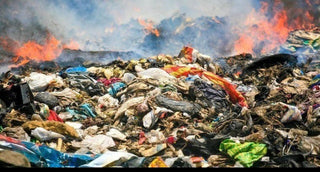When the story of the second Elizabethan era is written in the history books, it will be about the resetting of Britain’s influence in the world and the forging of a new relationship with the nations of the former “imperial family” under the banner of the Commonwealth. How will history remember the Carolean era (the reign of King Charles III) to which we now belong? This is perhaps too early to predict but it must include the struggle to preserve the environment by achieving carbon neutrality. To that end, it seems the Paris Climate Agreement (COP21) may prove as pivotal and era-defining as the Treaty of Versailles was in a postwar world.

This article explores an environmental crisis brought about by excessive consumerism, rampant overproduction, and unethical profiteering. The West African country of Ghana is famous, to continue the monarchal theme, for the Queen’s dance in 1961 with its then-President and Africa’s first post-colonial leader, Kwame Nkrumah. Half a century later, Ghana continues to move in step with British culture, with its very own Oxford Street, a bustling retail thoroughfare in the capital city, Accra. Trade between the nations stood at £1.2 billion in 2019, of which UK exports were £652 million. In March 2021, the UK and Ghana signed a trade partnership agreement which the then-International Trade Secretary and current Prime Minister, Liz Truss, described as a deal that “provides certainty for businesses that provide vital jobs and livelihoods in Ghana, and [it] strengthens the ties between our two countries”.
Notwithstanding the long-established socioeconomic ties between the UK and Ghana, there is an unpalatable, unromantic truth which must be addressed - the UK’s role, among other countries, in contributing to the environmental catastrophe caused by the wholesale export of textile waste to Ghana. On a daily basis, some 160 tons of textile waste ends up in Accra’s brimming landfill sites or is discarded into open sewers, choking waterways and blighting local marine ecosystems.
In 2021, the UK exported £70M ($80M) of used clothing to Ghana, more than any other country including Ukraine (£50M/ $58M). UK-based exporters include charity-affiliated collectors and commercial textile merchants, who collect, sort and export bales of used clothing to Ghana. Wholesalers in Ghana import 15 million garments per week at a cost of £83K ($95K) per container, of which up to 40% (6 million garments) are unsaleable and discarded as waste. In 2020, Ghana imported £159M ($182M) in used clothing, becoming the largest importer in the world. Ghana imports used clothing primarily from the UK, China, Canada, South Korea and Poland.

NGO’s have studied and documented this emerging crisis which is fuelled inexorably by the west’s predilection for fast fashion. The issue is further exacerbated by the adoption, in sport apparel production, of synthetic textiles which can take centuries to decompose and present a particular challenge to recycling efforts, although innovative technology-driven solutions are being developed and are in the ascendancy.
To help address textile waste, we at Neem have introduced the Wear Well bag. Customers can purchase a 2kg, 3kg, or 10kg bag, fill it with clothes they no longer need, and send it back to us using a provided shipping label. We sort the clothes, recycling those suitable for reuse in our shirts and donating the rest to the Salvation Army. In return, customers receive £30 in Neem credit. This initiative supports the circular economy by keeping clothes out of landfills.
To truly address this environmental crisis, a comprehensive approach is needed. Education and awareness campaigns can play a vital role in shifting consumer behaviours towards more sustainable fashion choices. Governments should implement and enforce regulations that encourage sustainable practices across the fashion supply chain, from production to disposal. Furthermore, there is a need for investment in recycling infrastructure and innovation in textile technology, making it easier and more efficient to recycle synthetic fibres. Collaboration between countries, particularly those heavily involved in the textile trade, is crucial to developing international standards and sharing best practices. Only through collective action can we hope to mitigate the environmental impact of the fashion industry and protect the planet for future generations.
Sources:
https://www.gov.uk/government/news/uk-signs-trade-partnership-agreement-with-ghana
https://www.abc.net.au/news/2021-08-12/fast-fashion-turning-parts-ghana-into-toxic-landfill/100358702
https://www.statista.com/statistics/386258/destinations-uk-united-kingdom-used-clothing-exports (https://www.statista.com/statistics/386258/destinations-uk-united-kingdom-used-clothing-exports/)/
https://oec.world/en/profile/bilateral-product/used-clothing/reporter/gha?redirect=true


